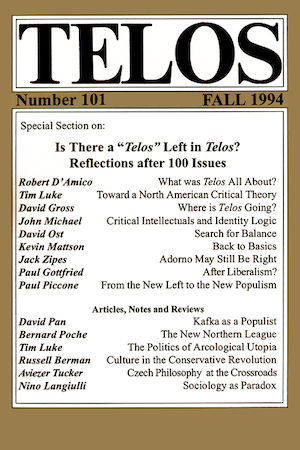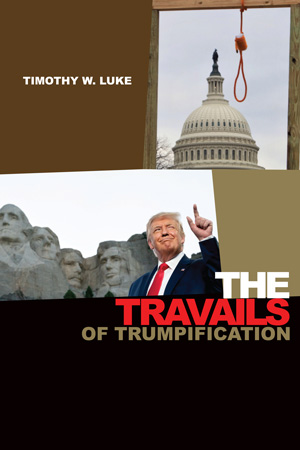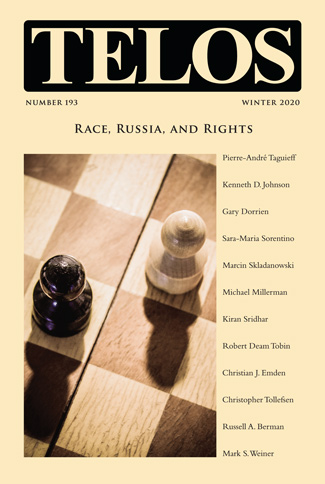In today’s episode of the Telos Press Podcast, David Pan talks with John Milbank about his article “A Tale of Two Monsters and Four Elements: Variations of Carl Schmitt and the Current Global Crisis,” from Telos 201 (Winter 2022). An excerpt of the article appears here. In their conversation they discuss the three idioms into which Milbank divides Carl Schmitt’s thought; why they should be seen as separate idioms rather than different aspects of a single perspective; the extent of overlap between the idioms; whether the decisionist Schmitt is as arbitrary as he is made out to be; the characteristics of a medieval European conception of nomos that Schmitt wishes to retrieve; the similarities between Schmitt’s third idiom of global regions and both Nazism and Russian theorists like Gumilev, Panarin, and Dugin; Schmitt’s decisionism, basic values, identity, and thinking through popular sovereignty. If your university has an online subscription to Telos, you can read the full article at the Telos Online website. For non-subscribers, learn how your university can begin a subscription to Telos at our library recommendation page. Print copies of Telos 201 are available for purchase in our online store.
Piccone’s critique of his critics, “From the New Left to the New Populism,” was intended not to lay claim to any settled doctrine for Telos but to demonstrate the journal’s ability to constantly rethink its position among current debates along the entire ideological spectrum. While the bellum omnium contra omnes Piccone refers to in his article specifically refers to Telos‘s own family, I think it is more than fair to say it was applied to any and all who asserted a suspicious and artificial ground for emancipation. Toward this end, Piccone begins by providing his own critique of the Western Marxist tradition out of which Telos arose. This in itself, in its pure compactness, is a tour de force of intellectual history and should be read by all those who seek an origin story, or who simply need to have their revision revised. Populism has now arrived in China. As opposed to the 1989 protests driven by students as well as an intra-government political struggle, the current unrest, while including students, has been driven much more clearly by a broader mass of people who have grown frustrated with the bureaucratic overreach of the zero COVID policy. With the largest and most comprehensive system of bureaucratically organized surveillance, management, and domination of the populace in the world, China has certainly been ripe for such populist revolt. While the original theory of the new class was developed by Milovan Djilas in order to explain state socialism in the Soviet Union, the populist reaction to the new class has up to now been associated mainly with liberal democracies whose state bureaucracies are still relatively undeveloped when compared to the Chinese version. The Chinese state receded somewhat during the reform and opening up period, but the rule of Xi Jinping, the growth of the surveillance state, and especially the zero COVID policy have led to new extremes in the level of new class management of the population. Moreover, the lockdowns and their economic effects have highlighted the divide between the new class and the broader populace. As one protester shouted to the police, the police are state functionaries with stable incomes while most of the people are dependent on the flourishing of a market economy that has been throttled by the COVID lockdowns. Save 20% on the paperback edition of The Travails of Trumpification by purchasing it in our online store and using the coupon code BOOKS20 during checkout.
Dear Telos readers, I’m excited to invite you to attend a special event at the John D. Calandra Italian American Institute in New York City on October 14–15, 2022, to celebrate the 200th issue of Telos, which will be appearing in Fall 2022. You can register for the event at the Telos-Paul Piccone Institute website, at www.telosinstitute.net/telos200. The event will take place from 3 pm to 6 pm on October 14 and from 9 am to 5 pm on October 15. The admission is $100 for both days and includes a reception on October 14 and lunch on October 15. The event will feature Joel Kotkin (author of The New Class Conflict) and Michael Lind (author of The New Class War: Saving Democracy from the Managerial Elite) as keynote speakers, who will discuss the new politics of class.
|
||||
|
Privacy Policy · Data Protection Copyright © 2026 Telos Press Publishing · All Rights Reserved |
||||





